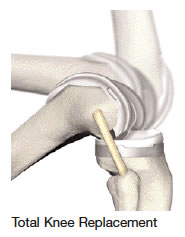

 To begin the surgery, the surgeon will make an
incision on the front of your knee, cutting
through the tissue surrounding the muscles and
bone. The kneecap, or patella, is rotated to the
outside of the knee, to help your doctor see
the area where the implant will be placed. The
surgeon will use special cutting instruments to
measure and make precise cuts of the bone.
The end of the femur (thigh bone) is cut into a
shape that matches the corresponding surface
of the metal femoral component. The femoral
component is then placed on the end of the
femur.
To begin the surgery, the surgeon will make an
incision on the front of your knee, cutting
through the tissue surrounding the muscles and
bone. The kneecap, or patella, is rotated to the
outside of the knee, to help your doctor see
the area where the implant will be placed. The
surgeon will use special cutting instruments to
measure and make precise cuts of the bone.
The end of the femur (thigh bone) is cut into a
shape that matches the corresponding surface
of the metal femoral component. The femoral
component is then placed on the end of the
femur.
The tibia (shin bone) is prepared with a flat cut on the top. The exposed end of the bone is sized to fit the metal and plastic tibial components. The metal tibial component is inserted into the bone. Then a plastic insert is snapped into the tibial component. The femoral component will slide on this plastic as you bend your knee.
If needed, the patella (kneecap) is also cut flat, and fitted with a plastic patellar component. Bone cement may be used to help secure the implants onto your bone. Your surgeon will conduct several tests during the surgery to ensure the correct sized components are used to help you regain good balance and motion in your knee. Your surgeon will then close the wound in layers with stitches and/or staples.